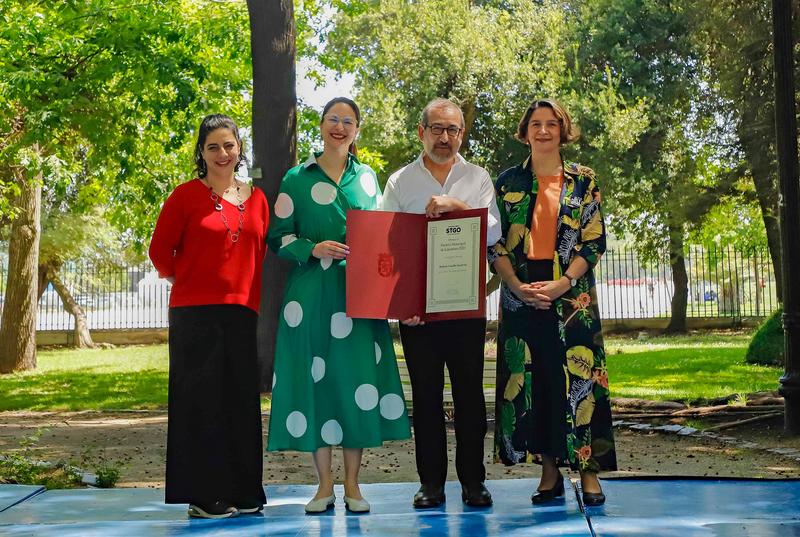Professor of Spanish and Comparative Literature Receives Chile’s Most Prestigious Literary Award

Photo by Patrick Montero.
Details
The honor enshrines Roberto Castillo Sandoval into the pantheon of Chile’s most distinguished writers.
Professor of Spanish Roberto Castillo Sandoval was certain the good news was really just a fever dream. Then in the throes of COVID, he figured the phone call that he received in late October informing him he would be the 2023 recipient of Chile’s oldest and most prestigious literary prize was a figment of his imagination.
But the WhatsApp message from a government representative in Santiago that arrived the next day confirmed it. Castillo would indeed receive the Premio Municipal de Literatura de Santiago for his most recent book, La novela del corazón (which translates from Spanish to The Novel of the Heart), enshrining him in the pantheon of Chile’s most distinguished writers.
“It is an incredible honor to receive this award because of the giants preceding me. I don’t mean to compare my work with theirs, but Pablo Neruda is there with other great writers, like Roberto Bolaño,” says Castillo, who traveled to Chile in late November to receive the award from the mayor of Santiago. “It was a very moving ceremony for me. I’ve been living away from Chile since 1979, so going back and getting this award from the mayor of my hometown is personally very meaningful.”
Castillo’s book was selected from a pool of hundreds of submissions and emerged as the winner after a lengthy selection process. In a declaration that accompanied the honor, the selection committee noted that the book “unfolds as an immersive and aesthetically daring literary exploration with the heart as its epicenter — a tangible organ, transplanted, manipulated, safeguarded, and revered. Original and dizzying in its narrative and reflective in its essence, the novel unfolds through the juxtaposition of stories that engage in a dialogue between historical reality and fiction.”

It’s no surprise that the human heart is the central device of his book since the organ has intrigued Castillo from a young age. From his cozy, book-filled office in Hall Building, he recalls the seemingly endless national news coverage of Chile’s first successful human-to-human heart transplant as a child. The procedure was conducted in 1968 by surgeon Jorge Kaplán, who, as the first surgeon in Chile to perform a successful heart transplant, was catapulted to instant fame.
“It’s been a fascination ever since,” Castillo says. “[Kaplán] became a national hero, somebody who propelled Chile into the world’s advanced nations.”
When it came time to dive into the project that ultimately emerged as La novela del corazón, published in 2022 by Laurel Editores, a highly respected independent press, Castillo turned to those early memories and nearly 20 years of research he’s conducted into the history and ethical gray areas that marked the early days of heart transplants. On a lark, he even called Temple University Hospital and asked — naively, Castillo says — if he could witness a heart transplant. Much to his surprise, he was granted permission.
“I thought they were going to send me to the rafters to watch from a distance,” he says. “But as soon as I got in, the head surgeon said, ‘Give him a splatter guard.’ At that point, I realized that I wouldn’t be far away. I was right next to it.”
The experience at Temple, from the intense preparations to the resumption of the donor heart’s beating, is woven into the book from the perspective of a character that serves as Castillo’s alter ego. But La novela del corazón is much more a political book than a medical one, he says, and uses the history of heart transplants in Chile as a vehicle to explore the disappearances and political violence that occurred there during the 1970s and 80s when Augusto Pinochet ruled as Chile's president following a military coup.
Much like Castillo’s previous books, which include a compendium of imaginary obituaries and a fictional account of Arturo Godoy, the legendary Chilean boxer who faced off with Joe Louis, La novela del corazón has been warmly received by critics. Writing in Las Últimas Noticias, prominent literary critic Patricia Espinosa called it “a tremendous book, profound, violent, beating in a rebellious and desolate manner, destroying the romantic imaginary with overwhelming force.”
But for Castillo, the ultimate praise came from Raúl Zurita, who received the prize himself in 1995 and who Castillo calls the greatest living Spanish-language poet. “I finished reading La novela del corazón a few days ago, and everything I say about it falls short: It is a masterpiece,” Zurita says.
Castillo’s forthcoming work will be much less visceral but no less intriguing. Apart from teaching, he’s considering a nonfiction work focused on the history of 2 College Circle — which once housed Rufus Jones and where Castillo has lived since 2007 — while also writing a novel in Argentinian Spanish that features a dog as its protagonist.




